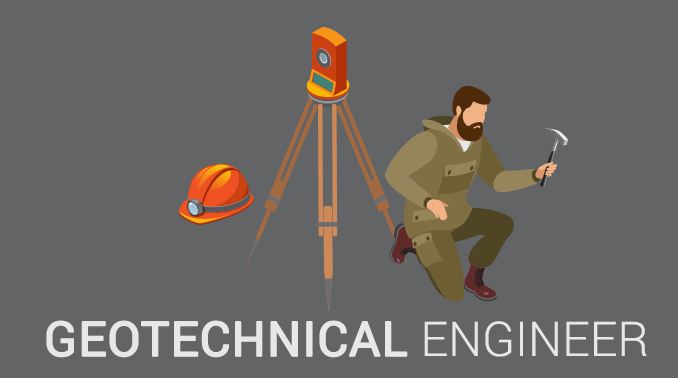Get This Report about Geotheta
Get This Report about Geotheta
Blog Article
Everything about Geotheta
Table of Contents7 Simple Techniques For GeothetaHow Geotheta can Save You Time, Stress, and Money.Not known Details About Geotheta An Unbiased View of GeothetaThe Of Geotheta

They carry out website examinations, collect examples, perform lab examinations, and analyze information to review the suitability of the ground for building projects - Geo Tech Engineering. Based upon their searchings for, geotechnical designers supply referrals for structure style, slope security, retaining frameworks, and reduction of geotechnical hazards. They team up with various other experts, such as architects, architectural engineers, and construction groups, to make sure that geotechnical considerations are integrated right into the general job layout and implementation
By analyzing the habits and residential or commercial properties of soil and rock, they can identify potential geotechnical hazards such as landslides, dirt negotiation, or incline instability. Their knowledge aids avoid failings or crashes that might threaten lives and residential or commercial property. Here are some comprehensive responsibilities and responsibilities of a geotechnical engineer: Site Investigation: Geotechnical engineers conduct site investigations to gather data on subsurface conditions.
They interpret the information to comprehend the buildings and behavior of the dirt and rock, including their toughness, leaks in the structure, compaction attributes, and groundwater conditions. Geotechnical Evaluation and Design: Geotechnical designers analyze the data gathered throughout website examinations to examine the stability and suitability of the website for building jobs. They carry out geotechnical computations and modeling to assess variables such as birthing capability, negotiation, incline stability, side planet pressures, and groundwater flow.
The Geotheta PDFs
Structure Layout: Geotechnical designers play an essential function in designing foundations that can securely sustain the intended framework. They evaluate the dirt conditions and load needs to identify the ideal structure type, such as shallow structures (e.g., footings), deep structures (e.g (https://sketchfab.com/geotheta)., piles), or specialized strategies like dirt improvement. They take into consideration factors such as negotiation limitations, bearing capacity, and soil-structure interaction to develop ideal structure designs
They assess construction plans, screen website tasks, and carry out area assessments to verify that the layout recommendations are followed. If unanticipated geotechnical problems occur, they evaluate the situation and provide referrals for removal or changes to the style. Risk Assessment and Reduction: Geotechnical engineers examine geotechnical dangers and dangers connected with the task website, such as landslides, liquefaction, or soil erosion.

Collaboration and Communication: Geotechnical engineers work very closely with other experts associated with a task, such as architects, architectural engineers, and construction teams. Reliable interaction and cooperation are vital to integrate geotechnical considerations into the general project layout and construction procedure. Geotechnical designers give technical experience, answer questions, and make certain that geotechnical needs are satisfied.
What Does Geotheta Mean?
Here are some sorts of geotechnical designers: Structure Designer: Structure engineers focus on making and examining foundations for frameworks. They examine the dirt conditions, load demands, and site characteristics to determine one of the most ideal structure type and style, such as superficial structures, deep structures, or specialized techniques like heap foundations.
They assess the variables influencing incline security, such as dirt properties, groundwater conditions, and incline geometry, and establish techniques to avoid incline failings and mitigate dangers. Earthquake Engineer: Quake engineers focus on assessing and creating frameworks to endure seismic forces. They evaluate the seismic hazard of a site, examine soil liquefaction potential, and create seismic style requirements to make certain the safety and resilience of frameworks throughout earthquakes.
They do area testing, gather examples, and evaluate the gathered data to characterize the soil residential or commercial properties, geologic developments, and groundwater conditions at a site. Geotechnical Instrumentation Designer: Geotechnical instrumentation additional info designers focus on tracking and measuring the actions of dirt, rock, and structures. They mount and preserve instrumentation systems that keep track of elements such as dirt negotiation, groundwater levels, incline activities, and architectural displacements to evaluate efficiency and offer very early warnings of possible concerns.
Geotheta Things To Know Before You Buy
They perform tests such as triaxial tests, consolidation tests, direct shear examinations, and permeability tests to gather information for geotechnical evaluation and design. Geosynthetics Designer: Geosynthetics designers specialize in the style and application of geosynthetic materials, such as geotextiles, geogrids, and geomembranes. They utilize these materials to improve soil security, reinforce slopes, offer water drainage solutions, and control disintegration.
They often tend to be investigative people, which indicates they're intellectual, introspective, and investigative. They are interested, systematic, rational, analytical, and sensible. Some of them are also social, implying they're kind, charitable, participating, client, caring, handy, compassionate, tactful, and pleasant - Engineer of Record.
In the office setting, geotechnical engineers use specialized software devices to perform calculations, produce layouts, and assess information. They prepare reports, review task specifications, interact with clients and staff member, and coordinate project tasks. The workplace setup provides a favorable setting for study, analysis, and partnership with various other professionals associated with the job.
Everything about Geotheta
They often go to job sites to carry out site investigations, analyze geotechnical conditions, and collect data for analysis. These gos to include traveling to different places, sometimes in remote or difficult surfaces. Geotechnical engineers might carry out dirt tasting, conduct tests, and screen building and construction activities to make certain that the geotechnical aspects of the project are being carried out correctly.
Geotechnical designers also operate in specialized geotechnical laboratories. In these facilities, they perform experiments, perform tests on dirt and rock examples, and examine the design residential properties of the materials. Geotechnical laboratory engineers function thoroughly in these atmospheres, taking care of screening tools, running instruments, and recording information. They work together with other laboratory team to ensure accurate and reliable testing outcomes.
Report this page